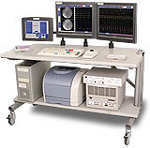 I admit that this is an inflammatory headline. But the recent settlement agreement entered in the EP MedSystems matter does little to refute the common wisdom that companies should never file a voluntary disclosure with BIS unless they are almost certain that BIS will otherwise discover the problematic export.
I admit that this is an inflammatory headline. But the recent settlement agreement entered in the EP MedSystems matter does little to refute the common wisdom that companies should never file a voluntary disclosure with BIS unless they are almost certain that BIS will otherwise discover the problematic export.
At issue are six shipments of seven items of heart monitor equipment valued at $510,590. The equipment was shipped by EPMed to Iran between March 2001 and April 2004 without a license. Shipments of these devices after July 26, 2001 would have been permissible under the Trade Sanctions Reform Act of 2000 provided that an OFAC license had been obtained. Five of the six shipments in question occurred after that date. The company agreed to settle the charges for payment of a fine of $244,000.
The company filed two voluntary disclosures relating to the shipments. The first was a preliminary disclosure that was filed on October 13, 2003, approximately two weeks after one of the shipments at issue had taken place. The second was a final disclosure which the company filed on November 20, 2003. Normally it would have been significant mitigating factor that most of the shipments described in the voluntary disclosure would have been granted a license if an application had been filed. BIS, however, paid no attention to that factor and, instead, focused on alleged misrepresentations in the voluntary disclosures themselves.
Four false statements in the preliminary and final voluntary disclosures were alleged by BIS. The first was the claim in the October 13 preliminary disclosure that the Company filed the disclosure “immediately” after learning of the shipments to Iran. The charging letter alleged that this was false because the company first learned of the shipments based on one email dated May 22, 2003, between unnamed EPMed officials A five-month delay is, perhaps, not immediate, but it hardly seems a sufficient justification for a significant fine for misrepresentation. Moreover, it may well have been the case that the Company had not yet discovered the May email or other earlier documents when it filed the preliminary disclosure in October.
Second, the charging letter took issue with the claim in the initial October 13 voluntary disclosure that the company did not know before October 2003 about the exports to Iran. This claim is also based on that single email in May 2003 between unidentified company officials and which the company may not have discovered at the time of the preliminary disclosure.
The third false statement pointed to in the charging letter allegedly occurred in the final version of the voluntary disclosure filed on November 20. According to the BIS charging letter:
In its disclosure EPMed stated that it “has no record of ever having sold any of its products to any customer in Iran.” This statement, representation or certification is false or misleading because, at the time it was made, EPMed had in its possession a number of documents indicating that the company had sold its products to Iran. These documents include an email between EPMed officials dated on or about May 22, 2003, which listed five hospitals that were operating EPMed equipment.
This is a confusing allegation since the preliminary voluntary disclosure made by the Company on October 13 appears to have indicated and admitted that the Company had such records. Indeed, how could the Company have made either the preliminary voluntary disclosure or the final one without such records? Here it looks like BIS’s charge either takes the sentence in question out of context or deliberately misreads it.
Fourth and finally, the BIS charging letter attacks a statement in the final voluntary disclosure that its European Sales Manager was “totally unfamiliar with the U.S. Government restrictions on exports to Iran.” This statement was false, according to BIS, because the European Sales Manager “had been informed of the U.S. embargo of Iran and knew that certain equipment required a license for export to Iran.” Again, BIS seems intent on stretching the likely meaning of the voluntary disclosure to find a misrepresentation in it. What was likely meant by the disclosure was not that the sales manager didn’t know that the U.S. forbade shipments to Iran. Rather, it seems likely that the company was truthfully representing that the sales manager didn’t know that U.S. law was violated by a company shipment to a German distributor who then shipped the goods from Germany to Iran.
So what lessons should be taken away from this? First, it remains clear that companies file voluntary disclosures with Commerce at their peril. Second, and more significantly, if a company feels that a voluntary disclosure is prudent (because, for example, discovery of the violation by BIS is likely), then the company should not file a preliminary voluntary disclosure under any circumstances. The danger of such a preliminary disclosure is that subsequent discoveries can later be used by BIS to claim that the initial disclosure constituted a misrepresentation. Third, and this should almost go without saying, if a company does file a voluntary disclosure, it should be careful that everything in it is accurate.
 Permalink
Permalink
Copyright © 2006 Clif Burns. All Rights Reserved.
(No republication, syndication or use permitted without my consent.)

 Posted by
Posted by  Category:
Category: 

